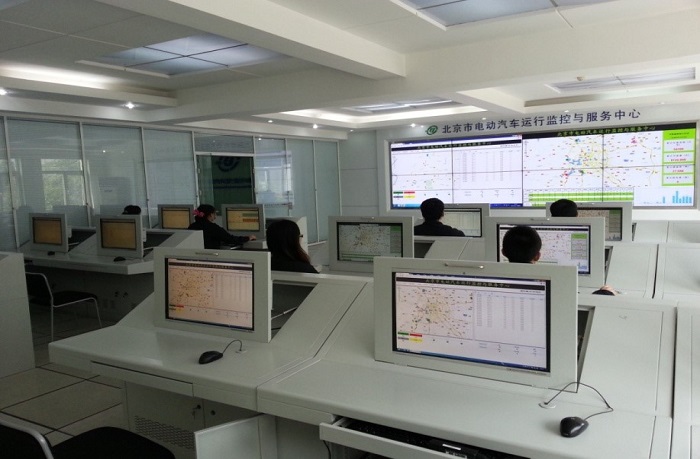Electric Vehicle Engineering and Technology Center (EVETC) has 36 faculty members, including 6 professors and 14 associate professors, among whom 1 is of Academician of Chinese Academy of Engineering, 1 of a Changjiang Scholar and 1 of experts of “Thousands of Foreign Experts Plan”. Currently, there are 229 graduate students in EVETC.

Figure 1 Group photo of laboratory faculties and staff
(Note: as the research center of national "211" universities, Electric Vehicle Engineering Technology Center (EVETC) of Beijing Institute of Technology has adhered to the "training China's senior automotive professionals" since its inception. At present, there are 6 professors, 14 associate professors and 15 lecturers in the laboratory, and the team owns strong teaching and scientific research ability, and has more than 220 studying masters and doctoral candidates)
EVETC is one of the earliest organizations that conduct research on electric vehicles in China. As early as the late 1950s, the laboratory began to introduce the Soviet-made electric drive military vehicles for electric driver research. Since 1992, it has begun to participate in the research and development work of electric vehicles organized by the original State Commission of Science and Technology for National Defense Industry. Since the national “8th Five-Year Plan”, its R&D work on electric vehicles has been strongly supported by Ministry of Science and Technology, Ministry of Industry and Information Technology, General Armament Department and Beijing Municipal Government. It has accumulated abundant research achievements in the scientific research of electric vehicles, industrialization and demonstration operation. Meanwhile, the laboratory has a profound research foundation in electric drive technology, and it is the authorized testing base of drive motors of the national 863 Project.

Figure 2 National Engineering Laboratory for Electric Vehicles
(Note: the laboratory’s testing base has passed the certification of CNAS and CMA, and it is the only designated testing base for motors and controllers of national 863 electric vehicles major special projects. The testing base can provide the maximum DC voltage of 1000V and the maximum current of 900A, the maximum rotation speed of motors to be tested is 20000r/min, and the maximum loading torque is 4500Nm.)

Figure 3 Big Data Center for Electric Vehicles
(Note: cloud platform technology and big data storage mining technology. EVETC has developed the monitoring and management platform for the implementation and operation of electric vehicles, realized the all-weather real-time acquisition and storage of operation data of 100,000 electric vehicles, and built the classifying pre-alarm system of electric vehicles, remote fault diagnosis system and vehicle operating service system, etc., which renders comprehensive data services for electric vehicles.)
It has successfully developed more than 20 kinds of electric vehicle products such as pure electric tourist buses, pure electric low-floor buses, hybrid power electric buses, fuel cell vehicles and pure electric cars, of which 10 kinds of these vehicle products are listed in China’s national automobile product announcement. Furthermore, it has developed quite a few key parts of electric vehicles with independent intellectual property rights, such as enhanced magnetism motor and controller for vehicle, permanent-magnet synchronous motor drive system, integrated electric drive mechanical automatic transmission system, standardized battery system and battery management system supporting rapid replacement, electric power steering system, APU system, high performance vehicle control system, fuel cell system. In the history of Olympic Games, EVETC carried out the emissions-free electric bus project in the central area for the first time, fulfilled the commitment of the Chinese government and achieved the state’s highest goal of “zero anchor of round-the-clock services of Olympic Games”, which generated a major response at home and abroad and received national recognition. Relevant technological achievements have been applied in batches in Shanghai World Expo, Guangzhou Asian Games and “10 Cities and 1000 Vehicles” Project. So far, the laboratory has formed a thorough technical system, and the technologies centered on the overall design of electric vehicles, vehicle control system, motor and motor control, power battery group and management, electric pile charging, electric power steering have been popularized and applied in a multiple of cities, mainly in Beijing.

Figure 4 Sponsoring IEEE Asia-Pacific Transportation Electrification Conference
(Note: Electric Vehicle Engineering Technology Center (EVETC) of Beijing Institute of Technology actively takes part in domestic and foreign academic exchanges, and actively takes its technical advantages in the electric vehicle industry, carries out effective technology exchanges and cooperation with international counterparts, and organizes electric vehicle technology exchange conferences at home and abroad for many times, which has not merely boosted the development of electric vehicle technology, but strengthened the academic level of Beijing Institute of Technology).
By tackling hard-nut problems of science and technology and making technological accumulation for a long term, EVETC has obtained a large number of intellectual property achievements, published more than 20 academic monographs and over 600 academic papers, and received over 70 authorized patents as well. It has presided over the drafting of a number of national standards and established Beijing local technical standard system for electric vehicle charging stations. Besides, it has formed more than 30 special technical specifications and enterprise standards for electric vehicles, obtained 30 software copyright registrations, and in addition, its research achievements have won 2 second prizes of National Invention Prize, 1 second prize of National Prize for Progress in Science and Technology, 3 first prizes at ministerial and provincial-level and multiple other provincial and ministerial prizes.